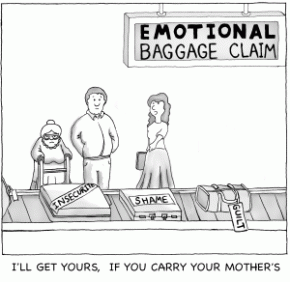Introduction
Coming out “of the closet” can be a defining moment for a gay individual. It can be invigorating, empowering, terrifying, dangerous, and evoke many emotions for anyone involved in the process. The definition of coming out, however, is not as simple as one may believe. In the anthology Boys Like Us: Gay Writers Tell Their Coming Out Stories, almost every writer gives a unique meaning of what coming out meant for him, and sometimes how it continues to impact his life. While their experiences were all interesting and provided many lenses in which gay identity could be appreciated under, as a human I found that some stories were more interesting to me than others. I was able to place myself into some writers’ situations, almost imagining that it was me living their experiences, while others’ stories seemed redundant and not as enlightening, as if I was merely an outside observer. Reflecting upon this dynamic, I realized that both writing style and the context of the authors’ experiences determined how easily I could relate to them, and in turn how compelling I found their stories to be.
Writers who were much more active in their writing, including explicit scenes from their lives instead of focusing on emotions and thoughts, were those who I tended to find more invigorating. While all of the stories were obviously lived experiences, some authors seemed to have written them in much more “real” styles. The use of profanity, the inclusion of very erotic sexual encounters, and an overall “tell it like it is” spirited style of writing led to a much more interesting and relatable experience while reading. How does this relate to health care and my goal of equitable care for all people? Listening to how people tell their story, regardless of their background or your own, is a skill that many need to improve on. It was apparent by examining my preferences that I paid better attention to people I can relate to or those whose stories I find intriguing, entertaining, or personally moving. While learning about what it means to actually come out, I believe the realization that I need to constantly be cognizant of and improve how I listen to others is the lesson learned from this experience.
The many definitions and explanations of coming out
In our society today, coming out (of the closet) predominantly means being open about your sexual minority status and membership in the LGBT community. This could be to one or more family members or friends, or even complete strangers. In the 1950s, however, Samuel Delany believed that coming out meant having your first sexually major homosexual experience. He writes “And what you came out into, of course, was homosexual society… Now coming out had become something entirely aimed at straights” (Merla). Ron Caldwell was never sure what being “out” actually meant. “I have no earthy idea what it means to be completely out, out of the closet… it seemed to me I didn’t really have to come out at all, that somehow my mere aspect conveyed to the world that I was gay” (Merla).
There are many nuances between the stories told in this anthology, with only a very few showcased previously. It is very evident that coming out means something different to almost everyone who goes through the experience. For some it is a rite of passage, for others a way to reveal a secret they may have been hiding for a long time, and for others it is a form of systematic oppression forced upon them by our very heteronormative society. Some people in the anthology came out to a single person at a time – close friends or family members – while others made the transition to out for the world to observe. The important aspect to be cognizant of when listening to or reading these stories is that this is a very unique process for each individual and should be treated as such. Once again the concept of equity applies over equality. It is important to realize the differences that make each individual’s story unique and think about how that has affected their experiences in life and the state of life they are currently in.
Parents as an example
Coming out to one’s parent(s) can be one of the most difficult processes of coming out in general. The fear of familial rejection causes many individuals to be hesitant. The quality of a parent’s listening as well as their reaction can define how well the experience transpires. Some parents are not as skilled at this as others, which is unfortunate.
Rodney Christopher came out to his father during a conversation which started with his father asking Christopher, “What’s wrong with you?” (Merla). He told his father that he was gay in a very roundabout fashion, but it was clear. Christopher recalls, “He looked disgusted with me… Dad asked my mom and sister to join us in the living room for a ‘family meeting’” (Merla). The meeting consisted of his father barraging him with inappropriate and hurtful questions about why he wound want to be gay, and never allowing his son to tell his story. Christopher’s sister finally gave him salvation and his father concluded the meeting. Not surprisingly, the father-son relationship was irreparably destroyed. Would this coming out story have been more positive if the father had been a better listener, or was he simply set in his ways of homophobia? I cannot accurately speculate, but I would like to think that a higher quality of listening would at least have allowed Christopher to feel heard, maybe not understood, but heard and appreciated.
Some parents, such as Ron Caldwell’s, were excellent listeners and his coming out to them ended up being a positive experience. “Nowadays, if my mother calls after a guy has stayed the night, I’ll roll over, pick up the phone, and tell her, with a giggle, what we’ve been doing – in general terms.” he writes (Merla). “She seems genuinely glad to know that I’m not keeping anything important from her” (Merla). Caldwell came out to his father later, but had a neutral to positive experience; “… he said it didn’t matter, that he’d thought or a long time that I might be gay, and just wanted me to be happy” (Merla). His father asked him questions and related to him based on his past experiences with having homosexual friends. The common link between this family was good listening, allowing Caldwell to tell his story, and asking him questions about it to better comprehend his experiences. This is a simply model that can be transcribed into almost any type of active listening process: listen, allow the storyteller to share their journey, and question them (positively, of course) to get a better understanding of their experiences.
Narrative Storytelling in Medicine
It is not surprising that I found certain stories to be more personable and interesting than others, but the reflection on how this affects the way in which people tell stories, and more importantly how people listen to them, was the true lesson learned from reading Boys like Us. When applying this to the health professions, Carmen Green’s work to promote storytelling in medicine, allowing patients to tell their story without interruptions to simply “get to the point” (Green) to save a health care practitioner’s time, comes to reference. Green states, “We empathize more with people who are like us, and are more comfortable hearing their stories, rather than those who are not like us. As simplistic as it sounds, we are also more likely to provide better care for people that we can better relate to or we like. Without the patient telling their story, the listener has no context for what the illness means to the patient” (Green).
Conclusion
We all have personal biases based on our lived experiences that lead us to react uniquely to different situations. These biases can affect how effectively we listen when someone tells a story – whether it be their coming out story or their medical history, in the case of a patient. While some stories may seem more fun, interesting, and/or relatable than others, each person has their own experiences to share. It is important to remain conscious of our biases when listening to someone’s story so that one can effectively listen to their narrative. This involves taking extra time and effort, whether it be adapting to a new style of storytelling you have never heard before, or listening to someone’s experiences which you have had no previous exposure to. How we listen to an individual’s story can affect how it is perceived and what actions are subsequently taken. As medicine continues its evolution, Dr. Green points out that while medical students are currently rewarded for obtaining “pertinent and concrete” patient information in short periods of time, the true emphasis should be placed on taking the time to listen to everyone’s story, to let them guide the journey (Green). In the population I intend to study, many of these journeys will involve a coming out story, and it will be important to remember the individuality of expression that is a part of coming out. Everyone is the guide on their journey of life, and hopefully the medical field as well as I will become better listeners to all storytellers, no matter what their story may be or how they may tell it.
Works Referenced
Green, CR Listening: Can storytelling transform health care to enhance quality and ensure equity? Ann Arbor: University of Michigan; 2013.
Merla, Patrick. Boys Like Us : Gay Writers Tell Their Coming out Stories. 1st ed. New York: Avon Books, 1996. Print.


